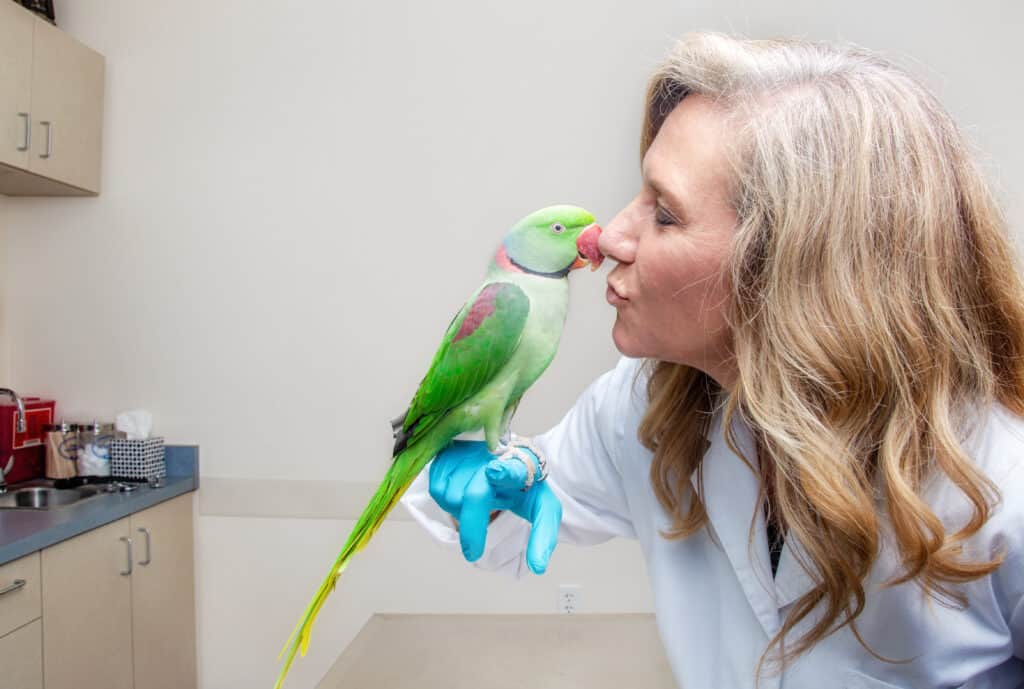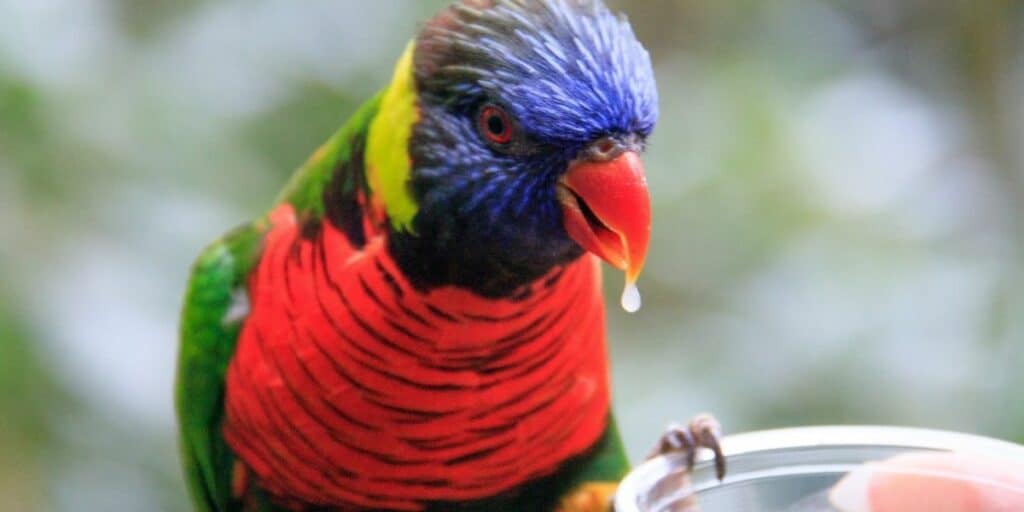Parakeets do not urinate in the way we do but they definitely produce urinary waste as they have a pair of kidneys in place. The main waste produced is uric acid which is excreted out along with feces through a common opening.
As a result, a semi-liquid white material along with a darker material is obtained. The whitish content is the uric acid produced owing to urination and the darker colored component is the feces.
Let’s dive deeper into this topic.
Table of Contents
How the Parakeet Urination System Works: A Quick Dive into the Excretory System of Parakeets
Like all birds, Parakeets (popularly also known as budgies) are uricotelic organisms which means the final product of their excretory system is uric acid. It is the ultimate result of the nitrogen metabolism in birds.
The wastes that accumulate in the bloodstream are typically the unused or leftovers of different metabolic processes and these wastes, rich in ammonia can be highly toxic for the organism.
Parakeets have kidneys that directly collect the wastes from the blood and convert it to uric acid and move it down through the urethra into the urodeum, a component of the cloaca.
The cloaca is the terminal point of the gastrointestinal tract, the reproductive system, and the renal tract.
Birds generally do not contain any kind of urinary bladder or urethral opening (ostriches are an exception to this). Hence the uric acid is excreted out into the world along with the poop through the cloaca.
Comparison of Human Excretory System and Parakeet Urination System
| Human Urinary System | Parakeet Urinary System |
| It has 4 main components: kidney, urinary bladder, urethra, and ureters. | It has 3 components: Kidneys, ureter, and cloaca. |
| Here the bladder stores the urine as long as it isn’t excreted out of the body. | Birds have no such option as there is an absence of a urinary bladder. |
| The waste gets released from the bladder through the urethra. Humans have different openings in the body for different purposes. | As there is no urinary bladder and no designated opening for urination, both the wastes of the kidneys and the intestinal tract go out into the world through a common opening called the cloaca. |
| They are regarded as ureotelic organisms as urea is their main excretory product. | Parakeets fall under the category of uricotelic organisms as uric acid is their main excretory product. |
| The production of urea takes away less energy than uric acid production. | The production of uric acid from ammonia takes up a lot of energy. It is costlier than urea production in terms of energy. |
Why do Parakeets Not Have a Urinary Bladder?
To understand why birds don’t have urinary bladders you first have to know why humans have urinary bladders.
Urea, which is the principal waste of human urine, needs to be diluted several times with water as it’s extremely toxic in nature. The dilution helps in to make sure that no harm is done to the body, even for the temporary period the urine is stored within the system.

But Uric acid, which is the principal waste of the bird urine, is not as toxic as urea. In fact, it is the least toxic product of nitrogen metabolism.
So, there is no need for an ample amount of water to dilute the end product to make it the least toxic for the body. Hence urinary bladder is not required for their survival.
Reasons Why Parakeets Excrete Uric Acid from Their Kidneys Instead of Urea
Helps in conserving water
Birds have way lower water thrust than most other vertebrates. This is because their system has evolved in a way that prevents unnecessary water loss.
- They don’t lose much water via their droppings.
- The production of uric acid takes far more energy than urea production. However uric acid production helps in saving up a lot of water.
As it’s not as harmful as urea, a little amount of water is needed for its excretion. So even if it’s a quite energy-expensive process, it helps in the conservation of water in Parakeets.
Keeps them lighter
More water will mean heavy water as urea will need water to dilute.
Suppose if birds produced urea instead of uric acids, as human do, they would be required to drink water on a continuous basis to keep the waste product diluted.
They would have needed a urinary bladder to store the excess water in the body. All these would have significantly affected their light bodyweight and made them heavier.
Flying burns loads of calories. Hence all birds, including parakeets, have evolved in a way so that their body remains as lightweight as possible. Otherwise, they would have trouble flying.
So by producing urea as the end waste product, they are eliminating the need of having a urinary bladder and frequent water drinking.
So Why do Parakeets & Other Birds Even Need Water Regularly?
It is true that birds have evolved in a way that prevents water loss in every step possible. This is one of the reasons why they don’t have sweat glands.
No matter how efficient their water-conserving system is, like all living organisms they need to drink water at least a few times a day to stay alive.

They don’t lose as much water during excretion as humans do but they still end up losing water through their droppings. Parakeets also lose water via respiration.
Owing to the superior adaptations, their water need is low, but it doesn’t mean that they can live without water.
Also, birds have a habit of bathing with water on a daily basis. So, they need water regularly for drinking and bathing.
FAQ
Q. What color is Parakeet pee and poop?
The color of Parakeet pee is predominantly white. This is because of the presence of urates (salts of uric acid) which is a semi-liquid paste. The pee color generally remains the same for all kinds of birds.
However, it is often seen that if the bird is on a high fruit and vegetable diet, the production of the white liquid content will be much higher.
The feces color can change depending upon the diet. It can be anywhere between brown and green.
Q. How frequently do Parakeets pee and poop?
Under normal circumstances, Parakeets are known to generate 35 to 40 droppings a day. But this can vary widely as per the diet and age.
In general, smaller birds like Parakeets produce droppings more frequently than bigger birds.
Conclusion
Parakeets share a lot of similarities with the human excretory system, but they have quite an important number of differences.
The main excretory product of their urine is uric acid. The excretion of uric acid doesn’t need as much water disposal as it does in the case of the excretion of urea in humans.
So even if an excess supply of energy is needed for uric acid production, it helps in saving the bird loads of water.




